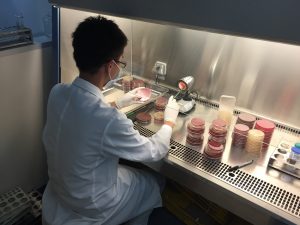Call for global action on life-threatening fungal infections
August 21/2017
Most of the students, faculty and staff at the Dalla Lana School of Public Health would agree that Professor Donald Cole is a fun guy. His cousin David Denning from the University of Manchester is a “fungi” too. Together they are tackling an emerging issue that the global health community has largely ignored: fungal disease.
On July 31, 2017, the pair published a ‘first of its kind’ series in The Lancet Infectious Diseases that issued a call to action to global policy makers to prevent millions of fungal infections annually.
“Generally speaking, people understand how antibiotic misuse leads to antimicrobial resistance, but most aren’t familiar with the consequence of antifungal misuse, which is untreatable fungal disease,” said Donald Cole, Professor of Global Health and Epidemiology at the Dalla Lana School of Public Health.
Cole co-authored the paper linking fungal disease control to public health with his cousin, David Denning. David and Juan Luis Rodriguez Tudela assembled the series along with other advisors for the Global Action Fund for Fungal Infections.
In many ways, fungal infections other than skin infections in our toes or hair are relatively invisible and therefore not a priority for health professionals or policy-makers. However, they affect more than one billion people annually and kill more than 1.5 million people. Fungal disease is more common among people with cancer, asthma and HIV, but yeast infections are rampant in the general population. Some fungi excrete mycotoxins that irritate the respiratory system or cause cancer and the drugs used to treat fungal infections are often toxic for humans, making treatment uniquely problematic. Specialized tests are required for accurate diagnosis and delays or missed diagnoses often lead to serious chronic illness, blindness or even death.
There have been enormous advances in fungal diagnostics and antifungal drug development over the past 20 years, but most of the world’s population has not benefited from these advances due to a lack of availability of these diagnostics, not enough trained people and insufficient antifungal drugs.
“The massive advances should have resulted in much better outcomes, but sadly not in many countries,” said Professor Denning. He is the lead author in the Series of eight reports that bring readers up to date on fungal infections and addresses how fungal infection management can be integrated into health systems in low-income and middle-income countries.
“The evidence gathered in this article series shows not only the scale of the global problem, but also that hundreds of thousands of deaths a year could be avoided,” said Denning, who notes that action on fungal diseases will have a direct impact on Sustainable Development Goal one, reducing poverty.
Professor Cole believes that it’s important for clinicians to work in partnership with public health systems to create a global network of infectious disease experts to diagnose, treat and report on fungal disease.
“If you have a relative with a compromised immune system as a result of cancer or another illness, then ‘thinking fungus’ is a good idea,” said Cole.

